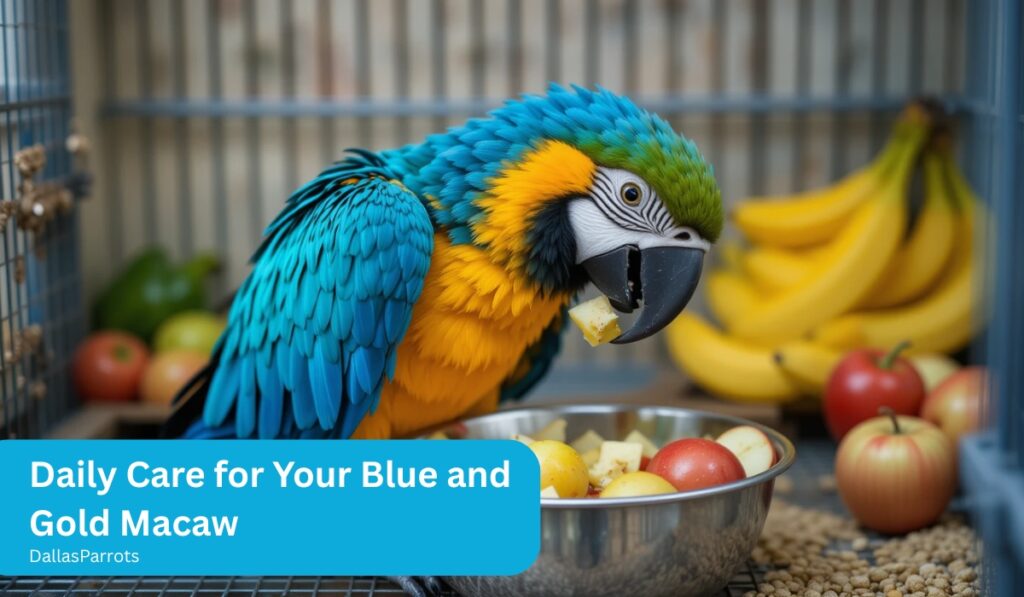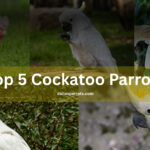
Blue and Gold Macaw Price, Lifespan, Care & Complete Guide
Blue and Gold Macaw, also known as Ara ararauna, is one of the most eye-catching and intelligent parrots in the world. With its bright blue wings, golden chest, and charming personality, this parrot easily wins hearts. But owning such a beautiful bird is not just about its looks — it also comes with a big responsibility. These parrots thrive on companionship, are emotionally intuitive, and require daily interaction to remain cheerful and in good health.
Buy Our Captivating Blue and Gold Macaw at Dallas Parrots.
If you’re drawn to the beauty and intelligence of exotic birds, consider the Blue and Gold Macaw available at Dallas Parrots. Known for their gentle nature and vibrant blue and golden feathers, these parrots make wonderful companions for bird lovers who are ready to experience the joys of a lifelong feathered friend.
-
Available Birds
Beautiful Blue and Gold Macaw Parrot
$7,200.00Out of stock. Join the waitlist to be notified when this product becomes available.
Lifespan and the Commitment They Deserve
Blue and Gold Macaws are not just beautiful pets, they are a lifelong responsibility. These parrots can live anywhere between 50 to 70 years, and in some cases, even longer when given proper care. This means choosing to bring one into your home isn’t just a short-term decision—it’s a decades-long commitment that requires planning, patience, and love.
Throughout their life, they need a stable environment, regular social interaction, and mental stimulation to stay healthy and happy. Neglecting any part of their care can lead to behavioral issues or even serious health problems. For many, owning a Blue and Gold Macaw is like having a lifelong companion—one that thrives best when treated as part of the family. If you’re considering bringing one home, make sure you’re ready to walk this beautiful journey with them, not just for a few years, but for a lifetime.
Essential Daily Care for Your Blue and Gold Macaw

Owning a Blue and Gold Macaw means meeting its daily needs to keep it healthy, happy, and engaged. Here’s a brief overview of their essential care routine:
Feeding: Provide a balanced diet that includes fresh fruits, vegetables, and premium-quality pellets. A variety of nutritious foods helps maintain their health and energy levels, with fresh water available at all times.
Social Interaction: These parrots thrive on human companionship. Set aside time for daily playtime and interaction to keep their emotional needs met and prevent loneliness.
- Social Time: At least 2-3 hours of direct interaction daily.
- Out-of-Cage Time: Supervised freedom to explore and exercise.
Exercise: Macaws require plenty of time outside their cage to fly freely, climb actively, and explore their surroundings for a healthy and happy life.Regular exercise helps them stay fit and prevent behavioral issues like feather plucking.
Mental Stimulation: Offer a variety of toys, puzzles, and activities to keep their minds sharp. Training and learning new tricks are excellent ways to provide mental challenges and deepen your bond.
Taking care of a Blue and Gold Macaw requires commitment to their physical, emotional, and mental well-being—but the rewards are truly worth it.
What They Eat: Ideal Diet for a Thriving Macaw
A nutritious diet is essential to keep your Blue and Gold Macaw healthy and thriving. Their diet should include a diverse mix of fresh fruits, crisp vegetables, nutritious nuts, and premium-quality pellets to support their overall well-being. This combination ensures they get the right balance of vitamins, minerals, and nutrients necessary for their overall well-being. However, certain foods should be avoided at all costs, as they are toxic to parrots. Ensuring a proper diet helps maintain their energy levels, feathers, and emotional health.
| Food Type | Examples |
| Fruits & Vegetables | Apples, bananas, carrots, leafy greens |
| Nuts | Almonds, walnuts (in moderation) |
| Pellets | High-quality formulated pellets |
| Foods to Avoid | Chocolate, avocado, caffeine, salty snacks |
Housing That Keeps Them Happy
Providing proper housing for your Blue and Gold Macaw is essential for their well-being. A suitable cage, along with the right environment, will help keep them healthy, happy, and engaged:
| Cage Dimension | Recommended Minimum Size |
| Length | 36 inches |
| Width | 48 inches |
| Height | 60 inches |
Perches: The perches inside the cage are important for promoting foot health. Provide perches of various diameters to mimic the natural branches macaws would encounter in the wild. This helps prevent foot injuries and encourages natural behaviors like gripping, climbing, and perching.
Toys: Toys are an essential component of your macaw’s cage setup, promoting mental stimulation and physical activity. Offer a variety of toys, including chew toys, foraging toys, and interactive games to keep them entertained. Toys provide the mental stimulation they need to stay happy and prevent boredom. Regularly rotating the toys will also keep things interesting for your macaw.
Location: The placement of your macaw’s cage is equally important. Place it in a well-lit area where the bird can get natural sunlight during the day, but avoid direct sunlight that can cause overheating. Keep the cage positioned far from any drafts, since cold air can easily lead to your macaw getting sick. Keep the cage in an area where the family spends time, so your macaw can enjoy being involved in daily activities.
Their Personality, Social Nature & Emotional Needs
Blue and Gold Macaws are known for being deeply affectionate and truly flourish in environments filled with social interaction. These birds form strong bonds with their owners, and they require regular engagement to stay happy. Without sufficient interaction and mental stimulation, they can become stressed or show signs of behavioral problems.
As intelligent and emotional creatures, macaws need more than just basic care—they need to feel like a part of the family to maintain their well-being. If neglected or left alone for long periods, they may develop destructive behaviors like feather plucking or excessive screeching.
Vocalizations & Noise Level: What to Expect
Blue and Gold Macaws are highly vocal birds, famous for their loud calls and impressive ability to mimic human speech. However, their vocal nature makes them unsuitable for quiet households. They can be noisy, which owners should expect before bringing one into their home.
Mimicking Human Speech
These macaws can learn to mimic human speech, adding a fun aspect to their behavior. However, their timing can be unpredictable, and they may speak loudly at inconvenient times.
Loud Squawks and Calls
These calls can be high-pitched and startling, especially when they’re hungry or playful.
Expect a Noisy Environment
Given their loud vocalizations, Blue and Gold Macaws are best suited for those who are comfortable with a noisy environment. Their calls can be overwhelming in certain living conditions.
Behavioral Effects of Noise
Without sufficient interaction, macaws may become overly vocal or start showing destructive behaviors. Regular playtime and attention can help manage their noise.
Training Tips: From Basic Commands to Trick Mastery
Training a Blue and Gold Macaw requires dedication, steady routines, and the use of positive reinforcement techniques. With these essential tips, you can help your macaw learn everything from basic commands to fun tricks while building a strong bond with them.
Positive Reinforcement
- Use treats, verbal praise, and positive attention to reinforce and encourage good behavior.
- Positive reinforcement helps your macaw understand what actions are appreciated, leading to repeated desired behaviors.
Consistency
- Keep training sessions brief and consistent, ideally lasting 10–15 minutes every day.
- Be consistent in the training process and commands used.
- Repetition helps your macaw learn and retain the behavior over time.
Socialization
- Expose your macaw to different people, environments, and animals.
- Help them feel comfortable in a variety of settings to prevent anxiety and fear.
- Early socialization helps build confidence and promotes well-rounded behavior.
Avoid Punishment
- Never use negative reinforcement or punishment like scolding or yelling.
- Negative behavior can lead to fear, aggression, or stress, damaging your relationship.
- Instead, concentrate on redirecting undesirable behaviors by using positive reinforcement.
Common Health Issues and How to Prevent Them
Feather Plucking: Often Due to Stress or Boredom
- This behavior is typically triggered by stress, boredom, or a lack of mental stimulation.
- Provide interactive toys and engage your macaw regularly.
- If persistent, consult an avian vet for advice.
Respiratory Infections: Maintain a Clean Environment
- Sensitive to poor air quality, dust, and drafts.
- Clean the cage regularly and avoid smoke and drafts.
Nutritional Deficiencies: Provide a Balanced Diet
- A varied diet is essential to prevent deficiencies.
- Offer a well-rounded diet that includes a variety of fruits, vegetables, and high-quality pellets.
- Avoid harmful foods like chocolate and avocado.
Regular Vet Check-Ups: Ensure annual visits to an avian vet for optimal health care.
- Regular health check-ups are essential for the early detection of potential health concerns.
- Schedule an annual visit to an avian vet.
- The vet can offer guidance on diet, behavior, and general care.
Grooming Routines Every Owner Should Know
Regular grooming is a vital aspect of your Blue and Gold Macaw’s care routine. Here are the key grooming aspects to consider:
| Grooming Aspect | Details |
| Beak and Nail Trimming | Trimming should be done by a professional avian vet or groomer to prevent overgrowth. Long beaks or nails can affect their ability to eat or perch. |
| Bathing | Regular bathing helps maintain healthy feathers and skin. Offer a shallow dish of water or give a gentle misting shower to keep your macaw clean and refreshed. Bathing also aids in feather maintenance. |
| Feather Care | Check for any signs of damage, parasites, or irregularities in their feathers. |
Macaws and Legal Ownership: Know the Rules
Some regions may require permits or have restrictions to protect native wildlife and ensure ethical treatment. Captive-bred birds are usually preferred, as they help prevent support for the illegal wildlife trade.
Some countries also restrict the import or export of exotic species to prevent the depletion of native populations. You should also be aware of the legal responsibilities that come with owning a macaw, such as environmental impact, and whether you need to report your pet to authorities.
The Cost of Ownership Beyond the Price Tag
Proper care requires an investment in their nutrition, housing, healthcare, and mental stimulation. Each aspect ensures that your macaw remains healthy, happy, and thriving in your care.
| Expense | Details |
| Food | High-quality diet, including fresh fruits, vegetables, and specialized pellets. |
| Housing | Spacious cage (36x48x60 inches) along with appropriate accessories like perches and swings. |
| Veterinary Care | Regular check-ups with an avian vet, vaccinations, and emergency healthcare. |
| Toys and Enrichment | A variety of stimulating toys to keep your macaw mentally engaged and prevent boredom. |
Best Toys and Enrichment Ideas
Macaws thrive when provided with a variety of engaging toys. Regularly rotating toys ensures that they remain interested and continue to challenge their problem-solving skills.
Providing a variety of toys keeps macaws engaged:
- Foraging Toys: Encourage natural hunting behaviors.
- Chewable Toys: Satisfy their need to chew and prevent destructive behavior.
- Interactive Toys: Stimulate their problem-solving skills.
- Rotate Toys: Regularly change toys to maintain interest.
Are You a Good Match for a Macaw?
Before bringing a macaw home, it’s essential to assess whether you’re ready for the long-term commitment. Consider the noise tolerance required for their loud vocalizations and whether you’re prepared for the financial responsibility of their care. With a lifespan of 50-70 years, macaws are a lifelong commitment that demands careful consideration.
Consider the following before bringing a macaw home:
- Time Commitment: Can you dedicate several hours daily for interaction?
- Noise Tolerance: Are you comfortable with loud vocalizations?
- Longevity: Are you prepared for a lifelong commitment?
Conclusion
The Blue and Gold Macaw is a magnificent bird that offers companionship and joy to those prepared for the responsibilities involved. Understanding their needs and staying committed to their care leads to a rewarding relationship for both the macaw and its owner.
For more updates, follow us on Facebook and Instagram
FAQ’s
How long do Blue and Gold Macaws live?
Blue and Gold Macaws can live 50 to 70 years, or even longer with proper care. This makes them a lifelong commitment, requiring consistent attention, nutrition, and companionship throughout their lifespan.
What should I feed my Blue and Gold Macaw daily?
A healthy macaw diet includes fresh fruits, vegetables, high-quality pellets, and some nuts. Avoid foods like chocolate, avocado, caffeine, and salty snacks, which are toxic to parrots. Fresh water should always be available.
Do Blue and Gold Macaws need time outside their cage?
Yes, they require daily out-of-cage time for exercise and exploration. Supervised freedom is essential to prevent behavioral issues like feather plucking and to support their physical and emotional well-being.
Are Blue and Gold Macaws noisy?
Yes, they are naturally loud and vocal. Their calls can be startling, and they may mimic speech at high volumes. They’re best suited for owners comfortable with a noisy environment.
What are common health problems in macaws and how can I prevent them?
Common issues include feather plucking, respiratory infections, and nutritional deficiencies. Prevent them with a balanced diet, clean environment, and annual visits to an avian vet.
Do Blue and Gold Macaws need grooming?
Yes, they require regular beak and nail trims by professionals, bathing or misting to maintain feather health, and routine checks for feather condition and parasites.



